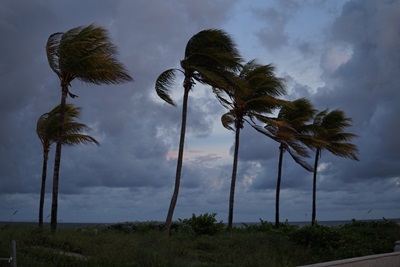Hurricane Preparedness
Hurricane season in Florida runs from June 1 – November 30 each year. Preparing for a hurricane or other natural disaster is important for everyone, but especially for families and caregivers of those with a memory disorder.
What to Bring
If you need to evacuate, it is important to be prepared and have a “go bag” ready. Here are a few items to have with you if you have to leave home in a weather emergency:
- Water (one gallon per person for at least 3 days)
- Food (at least a 3-day supply of non-perishable, easy to eat food, canned food and juice, non-electric can opener) and plastic bags for trash
- Radio (hand crank radio so you can listen to the National Weather Service for updates)
- Flashlight (with extra batteries)
- Medicines (7-day supply, laminate list of medicines including dose amounts and times, allergies and other medical facts); bring extra oxygen or special supplies, hand sanitizer and wipes
- First aid kit, extra hearing aid batteries, small sewing kit (with extra safety pins), and a small tool kit or multi-purpose tool
- Personal hygiene items (extra incontinent underwear, extra clothes, comfortable shoes)
- Copies of important papers (in a waterproof container), one-page health summary (request a free BayCare In Case of Emergency magnetic health file by completing the form on this page), emergency contact information, photo ID (extra small IDs with care receiver and caregiver information), proof of address, deed/lease to home, social security card, passport, birth certificates and insurance policies
- Cell phone with charger
- Extra cash (not too much) and travel wallet/purse (wear on shoulder or waist under clothes)
- Pet supplies (collar, leash, food, carrier, bowl, plastic bags for waste)
- Insect repellent and sunscreen
- Blanket, pillow (neck pillow), special quilt
- Paper and pencil/pen, distractors such as books, photo albums, recorded music
Shelters
Ahead of time, learn if the local shelter (evacuation center) can handle people with memory disorders. During a weather crisis, go to the shelter early to settle in a back corner area near restrooms and away from windows, exits and busy areas. See Florida Department of Elder Affairs Disaster Preparedness for additional resources.
If you need assistance evacuating, need electricity or oxygen for life-sustaining equipment, refrigeration for medication or have cognitive impairment or mobility issues that require special assistance, you must pre-register for a special needs shelter in your county (caregivers must also be registered).
For more information, call the Elder Helpline for local special needs shelters at (800) 96-ELDER (1-800-963-5337).
Additional Resources
- Diagnosing a Memory Disorder – what to expect during a memory disorders comprehensive assessment and evaluation
- Keeping the Brain Sharp – strategies to help reduce your risk of a memory disorder
- Silver Alert – what it is and how it can help if a loved one with dementia goes missing
- Word to Caregivers – advice and resources to help caregivers take care of themselves

